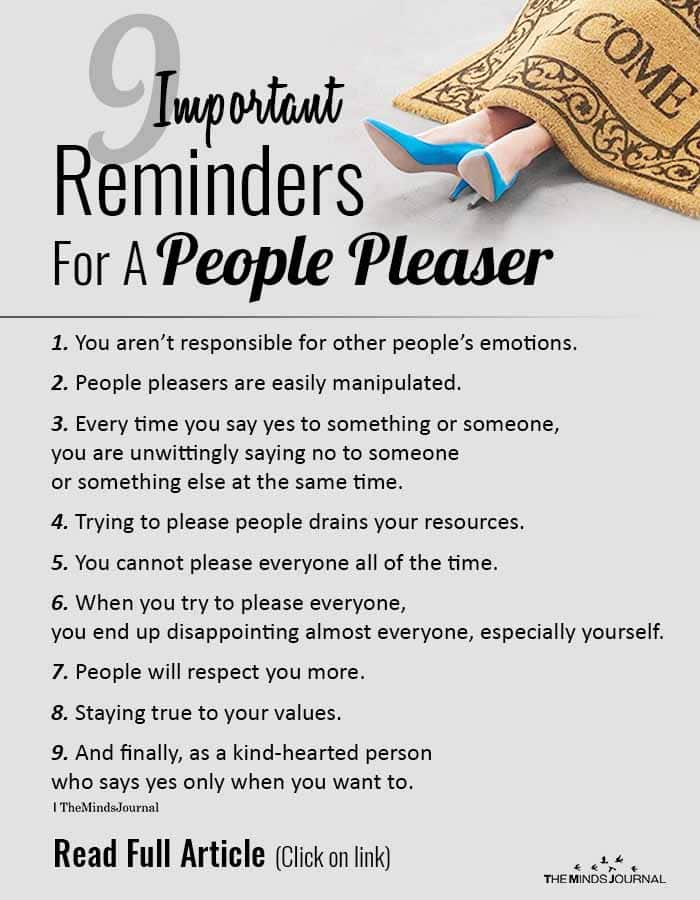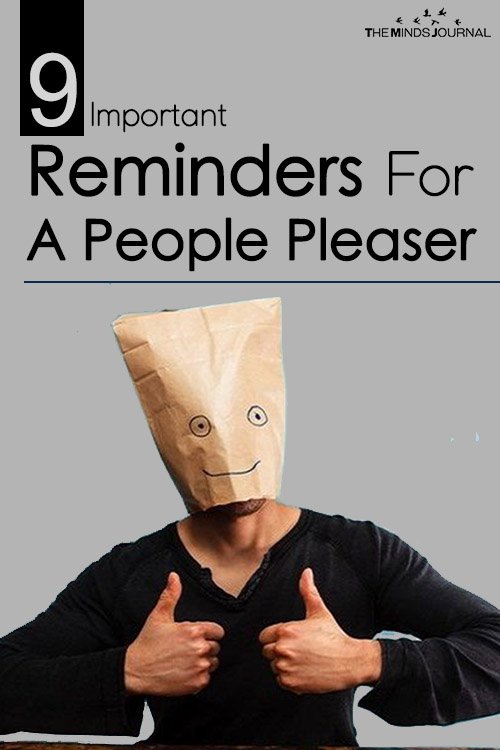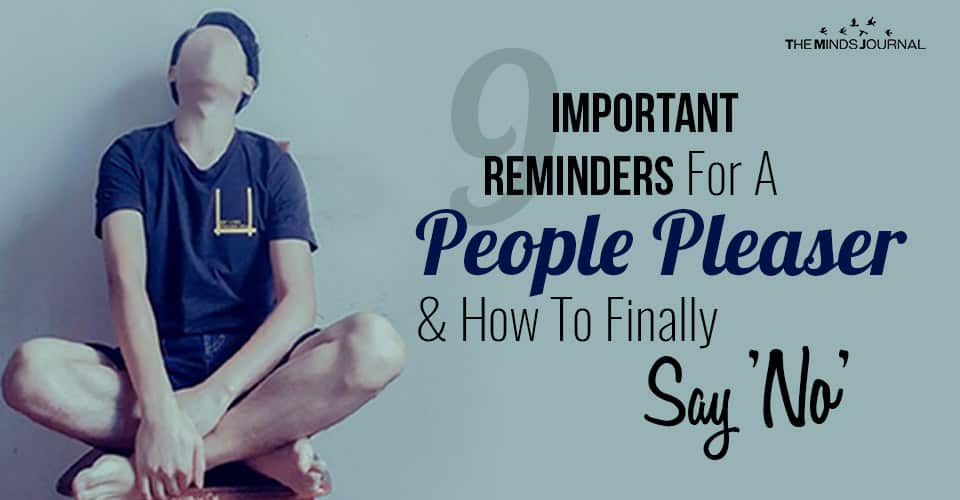Are you someone who is always working hard to fulfill everyone else’s wishes, but your own? Then here are a few reminders for a people pleaser!
People-pleasers “want everyone around them to be happy and they will do whatever is asked of them to” keep it that way, according to Dr. Susan Newman. “They put everyone else before themselves,” she said. For some, saying “yes” is a habit; for others, “it’s almost an addiction that makes them feel like they need to be needed.” This makes them feel important and like they’re “contributing to someone else’s life.”
People-pleasers yearn for outside validation. Their “personal feeling of security and self-confidence is based on getting the approval of others,” said Linda Tillman, Ph.D., a clinical psychologist in Atlanta, GA, and assertiveness expert. Thus, at the core, people-pleasers lack confidence, she said.
They worry about how others will view them when they say no. “People don’t want to be seen as lazy, uncaring, selfish, or totally egocentric,” Newman said. They fear “they’ll be disliked and cut from the group,” whether it’s friends, family, or co-workers.
9 Important Reminders For A People Pleaser

1. You aren’t responsible for other people’s emotions.
Whether you tend to do everything your partner wants, or you strive to make your co-workers like you, your people-pleasing efforts mean you’re taking on too much responsibility.
Everyone is in charge of his or her own emotions—and you can’t make anyone feel happy. It’s up to other people to cope with uncomfortable feelings like disappointment or anger. It’s not your job to protect them from those things.
2. People pleasers are easily manipulated.
You can often spot a people pleaser a mile away—and the more an individual says yes to requests, the more things are asked of her. People pleasers become easy targets. Someone may ask favors of them by saying things like, “I hate to ask you this, but…” or “I wouldn’t ask anyone else, but you’re such a good friend.”
Whether you feel guilted into doing something, or you feel honored that you’ve been entrusted with favor, you may be easily manipulated when others know that your primary goal is to please people.
Want to have some more reminders for a people pleaser? Read Being a People-Pleaser: Why It’s Dangerous and How to Stop
3. Every time you say yes to something or someone, you are unwittingly saying no to someone or something else at the same time.
That means all this time you spend trying to be a “yes” man or woman is totally bogus. So choose your “yeses” wisely. Your choices will always be unfavorable to some people.
4. Trying to please people drains your resources.
Trying to please everyone will rob you of mental strength. The more you think about whether someone is going to be upset, or how to phrase your decision in a way that isn’t offensive, the fewer resources you’ll have to devote to the decisions that matter most.
Worrying, ruminating, and rehashing conversations won’t help you get anywhere. If you spent that same time and energy being productive, you’d accomplish much more.
5. You cannot please everyone all of the time.
Seriously. You really can’t.
Want to know more about how you can stop being a people pleaser? Read 5 Lessons For People Pleasers
6. When you try to please everyone, you end up disappointing almost everyone, especially yourself.
Think about it. You say “yes” to 5 different things and as a result, you cannot possibly show up as the best possible version of yourself. How could you? You’re spread too thin! And then you probably end up late for something or some deadline, which makes you look flaky, causing you to be upset with yourself.
Listen to your instinct. It will never steer you wrong. Say no when you don’t want to say yes. It makes sense. It’s the stronger and wiser thing to do.
7. People will respect you more.
And as an added bonus, people will trust you more, because they know that you are not the kind of person who says yes to something you don’t want to do, nor are you someone who asks for something you don’t truly deserve.
8. Staying true to your values.
People pleasing can become a habit that causes you to lose sight of your values. Learning to tolerate people being upset with you can be hard, but it’s essential to reaching your goals.
Your words and your behavior must be in line with your beliefs before you can be truly authentic—and authenticity is the key to becoming your best self.
9. And finally, as a kind-hearted person who says yes only when you want to.
You’ll be more focused on things you actually want to do, putting you in a better mood, and making you a more successful person.
5 Keys to Finally Say ‘No’
1. Make peace with the fact that not everyone is going to like you—and actually, that’s okay.
The quote at the start of this article says it all. It certainly set my own mindset shift into motion a few years ago when I decided enough was enough and that I was going to start putting myself first.
When I feel my own pleaser instincts kick in, I always take the time to remember that it’s okay for people not to like me; I don’t like everyone and everyone isn’t going to like me.
As a pleaser, your main drive will be to do everything in your power to make someone like you. For me, and for many other pleasers, this comes from a place of severe low self-esteem. Basically, when people like you, you like yourself; when they don’t, your opinion of yourself drops.
The best way to lessen the need for validation from others is to start working on loving yourself and increasing your self-esteem.
As a starting point list all of the things that you love about yourself. Aim for at least ten things initially, and refer back to it and add to it regularly. Also, start treating yourself as you would a loved one or really good friend, and start connecting with people who love and accept themselves as they are. Model their behavior until it becomes your own.
Looking to know more reminders for a people pleaser? Read Are You A People-Pleaser? How Trying To Please Others Too Much Will Harm You
2. Learn to say no in a way that feels okay to you. (No making excuses allowed!)
“No” is a word that many of us could stand to use a little more often. How many times have you said no only to go back on your decision when putting under a little bit of pressure from another person?
I used to do that all the time or I would say no and then make a number of excuses to justify my decision (many of these were white lies to make saying no more feasible).
The thing with making excuses rather than offering a firm and honest no, complete with a truthful reason that you can stick to, is that it opens up the possibility of negotiation with the other person. If that happens, your inner pleaser is likely to give in and you’ll once again find yourself doing things that you don’t want to do and putting yourself last.
So, how do you stop this behavior? Say no in a way that feels good to you, but in a way that is strong.
You don’t have to use a one-word answer, but you should be truthful; for example, “I would love to help, but unfortunately, I have booked a me day that day,” or “That sounds like a great opportunity, but I think someone else would be better placed to help.”
Stick to the original answer and if someone tries to enter into negotiation them simply but firmly repeat it.
3. Accept that you will feel guilty when you say no to something the first few times.
Pleasers often feel guilty when they say no to a request. You probably feel that you are being selfish or that you have let someone down. This is misplaced guilt. You have done nothing wrong, and that person will most likely find another solution to their problem.
When you feel guilty, honor the feeling, but think about how much worse you would feel if you said yes to yet another thing that you didn’t want to do. The likelihood is that this would feel worse. Remember that the guiltily feeling will fade quickly.
If you feel that bad, grab your journal and list all the pros and cons of your decision. I bet the pros list is longer!
4. Start setting some boundaries.
It’s okay to put yourself first. In fact, you will be a happier, more productive, and more amazing person for it. The best way to do that? Set some boundaries. When we stand for nothing, we will fall for everything, as they say!
Find somewhere quiet, where you won’t be distracted or interrupted, and list all of the things that you’ve done over the past three to six months that you didn’t want to do.
Once you have your list, go through and write down the reasons that you didn’t want to do each thing. You will probably notice some recurring reasons; for example, it cut into my time with my family, it made me too tired, it wasn’t something I was comfortable doing because…
Use these reasons to start setting some boundaries for yourself. For example:
Getting enough sleep is important to me. If it stops me getting eight hours a night I will say no.
I don’t want to be around negative energy. If something is going to expose me to negative energy, I will say no.
If something goes against my values of honesty and integrity, I will say no.
Start by setting yourself four or five boundaries at first, and then practice upholding these over the next few months. You can then add more and gradually build up knowing what you will and will not accept in your life.
5. Let go of the people who use your people-pleaser tendencies on purpose.
As with anything in this life, there are people who will try to take advantage of your good nature.
As you begin to raise your levels of self-esteem and start to assert yourself, you will begin to see those who are trying to trigger your inner people-pleaser for their own benefit.
They will be the ones who deliberately try to push your buttons, no matter how many times you say no. They will continue to overstep the boundaries that you set.
The best thing to do here is to let them fall away from your life and accept the lessons that they’ve taught you about who you are and what you want in life.
If it’s not possible the let someone go completely, if they are a family member for example, simply create some healthy distance and prepare for any meetings that you may have with them by reaffirming your boundaries to yourself.
Remember, this is a process and if you slip back into old behaviors don’t be too hard on yourself. But do keep going and making progress, your life and self-esteem will be much better as a result!
If you want to know more reminders for a people pleaser, then check out this video below:











Leave a Reply